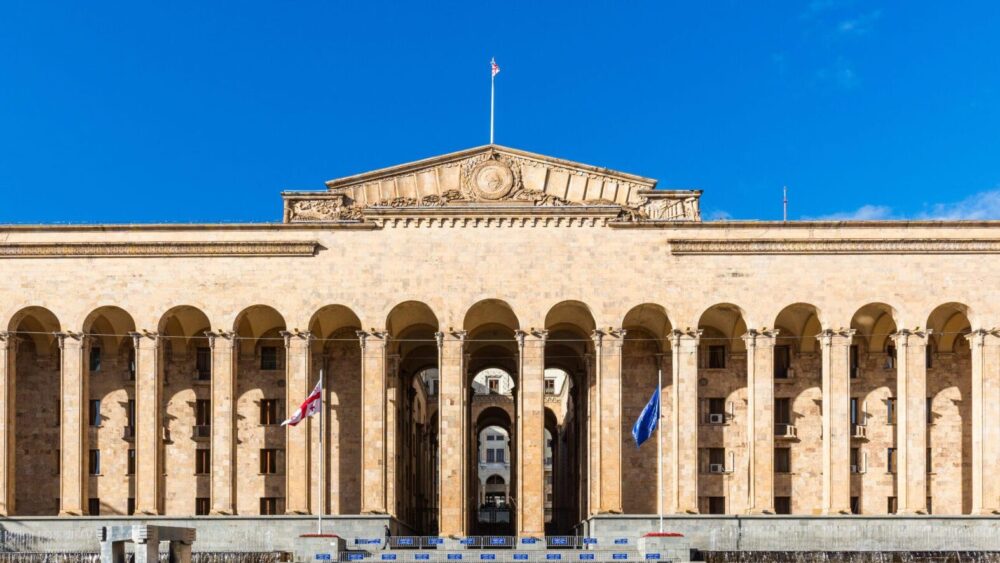
The Georgian parliament
By Diego Delso, CC BY-SA 4.0
The Georgian government adopted a new law aiming to safeguard traditional family values on its third and final reading on Tuesday, September 17th, immediately angering Eurocrats. Brussels accuses Tbilisi of homophobia and discrimination and demands the bill be withdrawn. But it’s up to Georgians, not Brussels, to judge the new law and they will soon have the chance to do so during next month’s general election.
“The Georgian Parliament adopted laws on ‘family values and protection of minors’ which will undermine the fundamental rights of the people and increase discrimination and stigmatization,” Joseph Borrell, the European Union’s High Representative for Foreign Affairs raged on X.
Borrell then went on to threaten Tbilisi with halting its EU accession process if it fails to withdraw the legislation. “I call on Georgia to withdraw this legislation, further derailing the country from its EU path,” he said.
The same threats were made by Brussels earlier this month, after the second reading of the bill. A statement from the Borrell-led diplomatic service said the law will have “important repercussions” on Georgia’s EU integration, and reminded Tbilisi that the process is “de facto halted” until the law is withdrawn and the country “recommits” to European values.
The Georgian Parliament adopted laws on ‘family values and protection of minors’ which will undermine the fundamental rights of the people and increase discrimination & stigmatisation.
— Josep Borrell Fontelles (@JosepBorrellF) September 18, 2024
I call on Georgia to withdraw this legislation, further derailing the country from its EU path.
The bill “On Family Values and Protection of Minors” was adopted in the 150-member parliament by an 84-strong majority of the governing Georgian Dream party, with no votes against it as the opposition parties chose to boycott the session.
The legislation outlaws same-sex marriage, adoption by same-sex couples, gender reassignment surgeries, changing the designation of sex on official documents, pride events and public displays of the rainbow flag, promotion of homosexuality and gender transition in media and advertisements, as well as any kind of display or promotion of LGBT ideology in schools.
“This initiative clearly distinguishes between those who prioritize the best interests of society and those who pursue external agendas. It differentiates between individuals who genuinely care about protecting human rights and those who attempt to promote harmful propaganda,” said Rati Ionatamishvili, the chair of the parliament’s human rights committee who submitted the package earlier this year, adding
The legislation aims to protect minors from detrimental influences, as some advocate for issues such as sex reassignment surgeries and the inclusion of LGBT materials in schools and kindergartens. It is evident that the opposition has distanced itself from Parliament due to its position on this initiative.
The law also establishes May 17th—the International Day Against Homophobia—as a new public holiday dedicated to “the sanctity of the family and respect for parents.” The Georgian Orthodox Church has been marking May 17th as ‘Purity Day’ for years to counterbalance the country’s biggest pride marches that have been usually held on that day.
The package describes marriage as a voluntary union between two individuals of different biological sexes with the purpose of family creation and explicitly prohibits the recognition or registration of any other type of union as marriage under Georgian law.
Although significantly stricter, the law has been likened to Hungary’s 2021 ‘child protection law,’ which banned the promotion of LGBT ideology in elementary schools and prime-time TV programs accessible to minors and was praised by conservatives across the West as an ‘exemplary’ measure for protecting kids from potentially harmful ideologies.
In contrast to the Georgian legislation, however, the Hungarian law makes no impact on the lives of adults nor does it try to interfere in anyone’s sexual preferences. Yet it was still enough to similarly anger the EU with Brussels resorting to freezing tens of billions of euros from Hungary’s cohesion funds as a punishment.
But despite the threats of ‘repercussions’ from Brussels, the Georgian law is for the people to judge, and with general elections just over the corner (scheduled for October 26th), they will soon have the chance to do so. The latest polls put the governing Georgian Dream at 43.5%, far ahead of the pro-Western main opposition party, UNM’s 15.1%.
